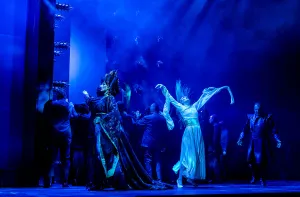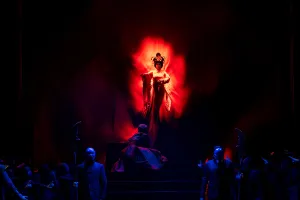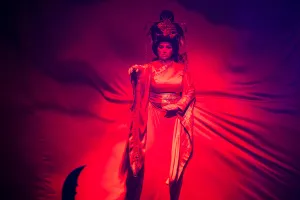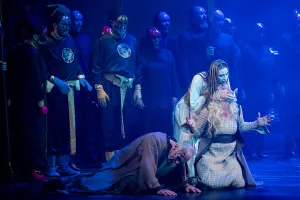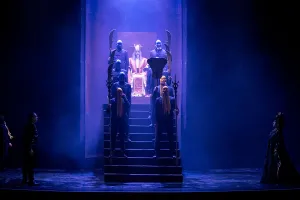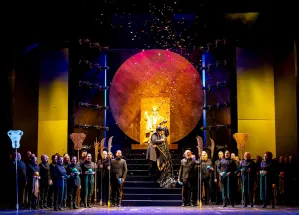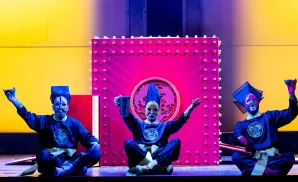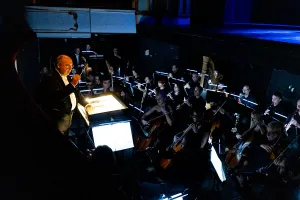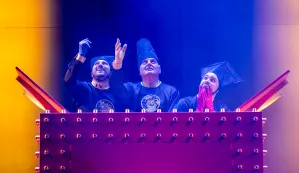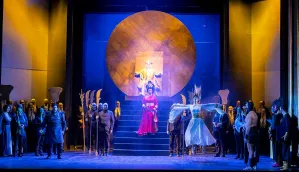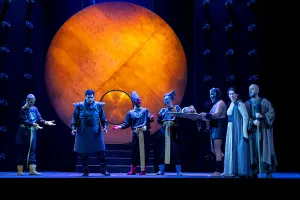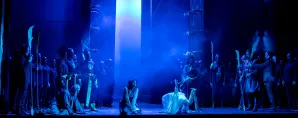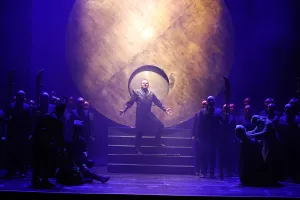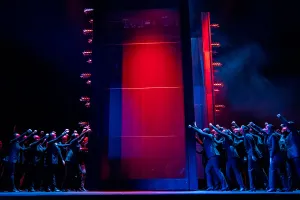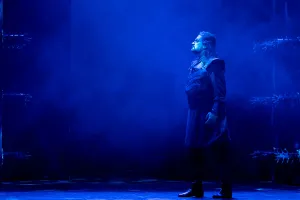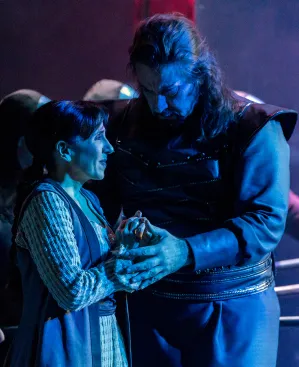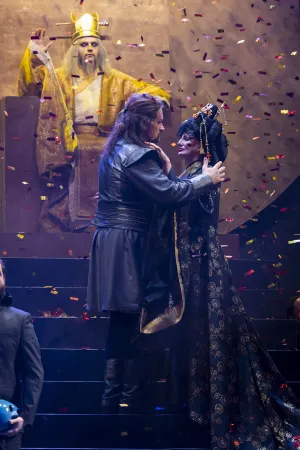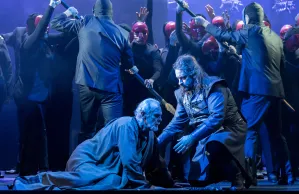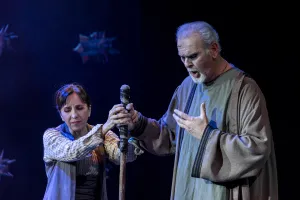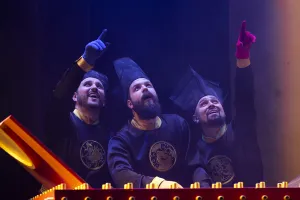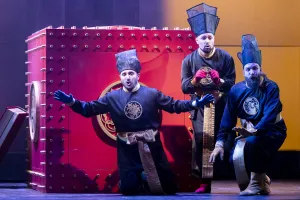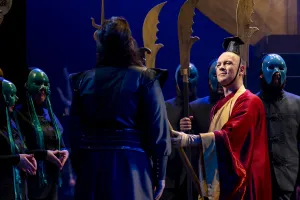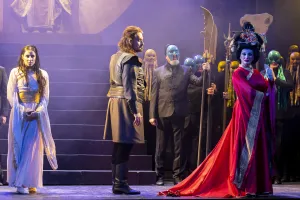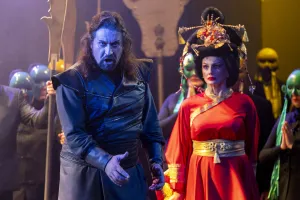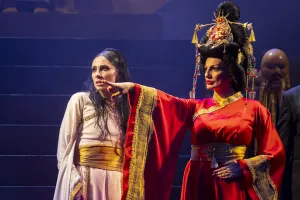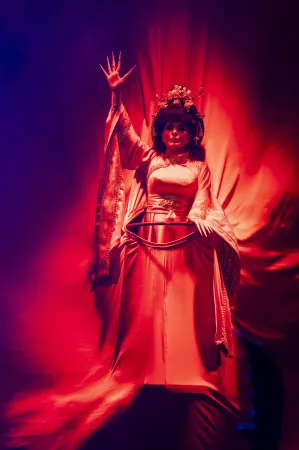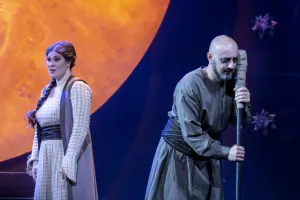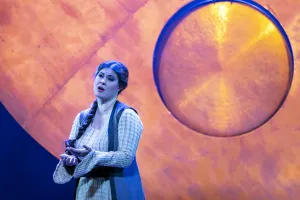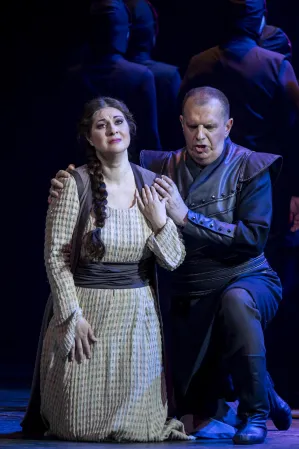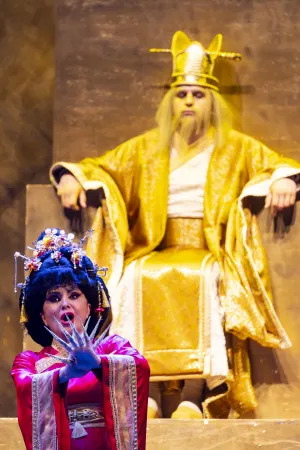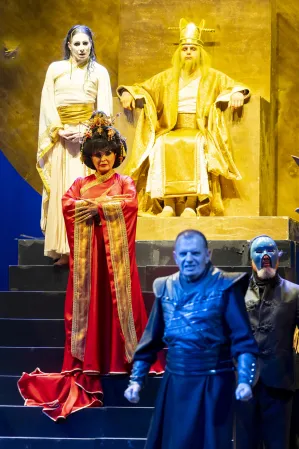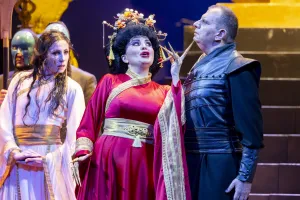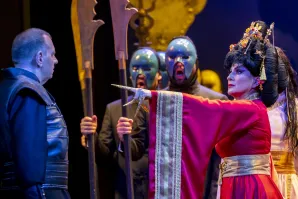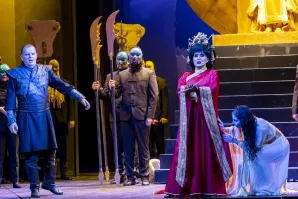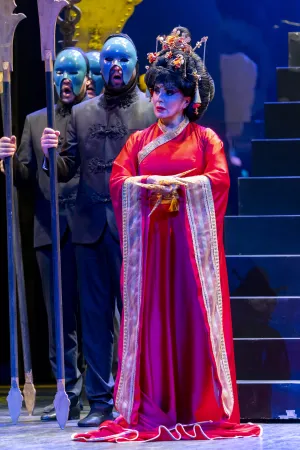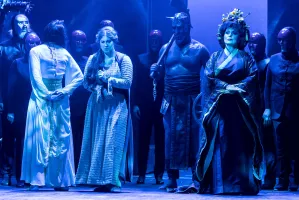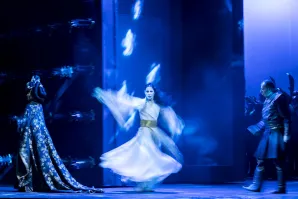Turandot
opera by Giacomo Puccini

GIACOMO PUCCINI (1858-1924 )
Born in 1858 in Lucca, Italy, Giacomo Puccini came from a long line of professional musicians. Giacomo was only five years old when his father, organist and choirmaster of the San Martino church, died. The post as organist and choirmaster was held, through an uncle, to ensure Puccini could assume the post when he was old enough in order to maintain the line of Puccini musicians presiding there, dating back 124 years. Young Puccini began his career as organist there when he was 14. Puccini was encouraged in his career as a composer by the positive reception for some of his church pieces and a cantata. Aida, the Verdi opera which he saw at age 18, also inspired him. Scholarships from a great uncle and Queen Margherita of Savoy enabled him to study at the Milan Conservatory from 1880-1883. Puccini did not care for city life, but it did influence his work. His bohemian existence as a poor student, sharing an apartment with two other artists, later found expression in La Bohème (just as the writer, Henri Murger’s early years as a poor author inspired his stories on which the opera was based). Though loosely associated with the verismo movement, which strove to create more natural and believable opera theatre, Puccini did not hesitate to write period pieces or to exploit exotic locales. In Tosca, he wrote an intense melodrama set in Rome during Napoleonic times. For Madama Butterfly, he chose an American story set in Japan. For Turandot, the story of an icy princess in ancient China. Puccini experienced some initial failure with Madama Butterfly (1904), but his faith in the work led him to revise it until operagoers accepted it. This initial failure temporarily prevented him from new compositions, but a visit to New York ultimately resulted in his writing his first ‘modern’ work in La Fanciulla del West. World War I caused the next major break in Puccini’s creative life. Hostilities complicated his negotiations to write an operetta for Vienna, now in enemy territory. The operetta became instead a light opera, La Rondine, produced at Monte Carlo and welcomed coolly at the Met as “the afternoon of a genius.” Puccini never regained his youthful eminence and romantic spontaneity, but he continued to work seriously, broadening his horizons. A chain-smoker, Puccini developed throat cancer and was taken to Brussels in 1924 for treatment by a specialist. Though the surgery was successful, Puccini’s heart failed, and he died shortly afterward. At the time of his death, he had been working on the most ambitious of his operas, Turandot, based on Schiller’s romantic adaptation of a fantasy by Carlo Gozzi, the 18th-century Venetian satirist. In Turandot for the first time Puccini wrote extensively for the chorus, and he provided an enlarged, enriched orchestral tapestry that showed an awareness of Stravinsky’s Petrouchka and other con
STEFANO ROMANI
For over twenty years present as Conductor at the Teatro Sociale of Rovigo, internationally re-nowned Oboist and Conductor. He awarded in 2004 with the San Francesco Prize city of Rovigo as leading exponent of the Rodigina culture for artistic merits, he graduated at the F. Venezze con-servatory in Rovigo with honors and honors under the guidance of Professor Franco Volpe, for over thirty years present on the international scene in the most prestigious Chamber concerts and thea-ters in the world. He started very young as oboist collaborating with the most important orchestras of the national panorama among these Orchestra della Scala of Milan, Orchestra of the Teatro la Fenice of Venice, Regional Orchestra of Tuscany, Chamber Orchestra of Padua and Veneto, Orchestra Toscanini of Parma, Orchestra dei Pomeriggi Musicali of Milan, OFV, etc., with internationally renowned conductors and soloists, J. Basmet, L. Harrel, M. Tipo, M. Horne, K. Ricciarelli, R. Blake, U. Ughi, A. Specchi, S. Accardo, M. Brunello, P. Maag, M. Campori, G. Sinopoli, G. Ferro, E. Inbal, K. Penderecki, R. Boninge, B. Campanella, M. Campori, M. Arena, D. Renzetti, etc. For about twenty years he has undertaken the activity as conductor with great success, especially in the opera repertoire that has seen him protagonist in the most important and prestigious stages of the world... Among his next engagements a Ballet on music by W.A. Mozart and a work of Cimarosa at the San Carlo of Naples, 150th anniversary of the National Theater of Belgrade with Puccini’s Manon Lescaut, a Cavalleria Rusticana of Masca-gni directed by K. Ricciarelli at the Taranto Opera Festival, a new production of Madama Butterfly of Puccini at the National Theater of Maribor with the direction of P. Maestrini and in February in Kazan in Russia at the Jalapin Festival with two productions of Nabucco and Rigoletto.
For about 8 years he was Artistic Secretary of the Filarmonia Veneta Orchestra and from 2009 to 2016 Artistic Director of the Sociale of Rovigo. Winner of the National Competition for teaching in conservatories, ranking in the first places, he sees himself as tenured professor at the F. Venezze conservatory in Rovigo.
MARIO PAVLE DEL MONACO
Mario Pavle del Monaco is an opera director of Serbian and Italian descent, born in 1993 in Rome and comes from a musical family of opera singers and opera directors. In Belgrade he graduated from high schools of music from two departments, piano and solo singing department (“Kosta Manojlović”, “Mokranjac”, “Dr. Vojislav Vučković”). In 2012, he left for Vienna (Austria) where he enrolled in Music Theatre Direction Studies (Opera Direction) at the prestigious University of Music and Performing Arts Vienna in the class of Reto Nickler, who entrusted him with the position of an assistant director in the opera “Don Giovanni” at the beginning of his studies. While at the University, he also mastered German, Italian, English, and he also speaks a little Russian. In the course of studies, he directed the opera “The Cloak” - G. Puccini, “The Florentine Tragedy” - A. von Zemlinsky, “The Abduction from the Seraglio” - W.A. Mozart and “Werther” - J. Massenet. In 2017, he completed his studies with the highest distinction, and was awarded the title of Master of Arts. In the same year, he received a special award from his University for exceptional achievements in the course of studies, with a special emphasis on his direction of the opera “Werther” by J. Massenet with which he graduated. After gaining experience at the Salzburg Festival with the opera “Il Trovatore” (G. Verdi) with Anna Netrebko in the lead role, he went to Germany (Würzburg), where he accepted a permanent engagement and got a five-year contract at the Mainfranken Theater Würzburg. Among other productions, he staged two operas for younger audience: “Colas der Magier” by W. A. Mozart, based on the opera “Bastien and Bastienne”, and the world premiere of the opera “Siegfried, der kleine Drachentöter” by A. Sieber. In the 2021/2022 season, he staged the opera “The Capulets and the Montagues” by V. Bellini.
Act I
Turandot, daughter of Emperor Altoum, has decreed that she will only marry if a suitor of noble blood can answer three riddles. If he cannot, the price shall be his head. The most recent candidate, the Prince of Persia, is to be executed at the moon’s rising. In the commotion outside the palace, a blind man falls to the ground, and his companion, Liù, asks for help. They are aided by a disguised Calaf, who recognizes the man as his long-lost father, Timur, the banished ruler of his land. Calaf, like his father, is running from enemies and concealing his identity, known only as the Unknown Prince. Liù continues to aid Timur, even in exile because years before, as she explains, Calaf bestowed a smile upon her.The people impatiently await the beheading. As the Prince of Persia enters, the crowd is suddenly moved and pleads with the Princess to pardon him. Turandot appears and dispassionately confirms the Prince’s sentence with a silent gesture. Calaf immediately is entranced by her beauty. Timur and Liù try to convince the smitten Calaf that he must leave with them, but he breaks away and attempts to announce himself as a suitor. The three ministers of the Imperial Household, Ping, Pang, and Pong, warn him of his folly, but to no avail. In one final attempt Liù begs him to listen, but Calaf ignores her entreaties and ceremoniously rings the gong, signifying his challenge for Turandot’s hand.
Act II
Ping, Pang, and Pong prepare for the eventuality of a wedding or a funeral. They discuss their misery since Turandot reached the marriageable age, numbering the many noble suitors who have met a deadly fate and reminiscing about life in their native provinces. Is there truly a man whose passion can melt Turandot’s icy heart? Their hopes are guarded.A crowd assembles for the Trial of the Three Enigmas. Turandot devised this system to avenge her ancestress, Lo-u Ling, who was captured, raped, then put to death by marauding invaders. She offers Calaf one last chance to withdraw, but he stands firm in his resolve. The first questionis offered: “What is born each night and dies each dawn?” Calaf correctly answers “Hope.” Slightly taken a back, Turandot poses the next riddle: “What flares warm like a flame, yet it is no flame?” Calaf hesitates, then answers perfectly “Blood.” Visibly shaken, Turandot asks the final question: “The ice that gives you fire, what can it be?” Calaf tarries, then triumphantly cries “Turandot!” The people celebrate his victory, but Turandot pleads with the emperor not to be given to this unknown prince. Seeing her distress Calaf decides to play her game and offers a riddle of his own: “If before morning you can discover the name I bear, I shall forfeit my life.”
Act III
It is decreed that none shall sleep, under penalty of death, until the name of the Unknown Prince is discovered. Calaf expresses his conviction that he alone will reveal the secret. Ping, Pang, andPong offer any prize, including his safe escape, if he tells them his name. Having been seen with Calaf, Timur and Liù are captured, and at Turandot’s request Timur is to be tortured until he reveals the truth. Liù steps forward and says that she knows the prince’s name but will keep it as her eternal secret. She grabs a soldier’s dagger and kills herself. Calaf reproaches the Princess for her cruelty and then takes hold of her and boldly kisses her. Turandot’s strength and desire for revenge leave her, and she weeps for the first time. Calaf reveals his true identity, thereby putting his life in Turandot’s hands. Trumpets announce the arrival of dawn and the assembly of the court. Turandot addresses the emperor and the people: “I have discovered the stranger’s name — it is Love!”
Premiere performance
Premiere, December 23, 2022
Main Stage
Giacomo Puccini
Turandot
Opera in three acts | Libretto by Giuseppe Adami and Renato Simoni, based on fairy tale of the same name by Carlo Gozzi
First performance in La Scala, Milan, April 25, 1926.
Conductor Stefano Romani / Đorđe Pavlović
Director Mario Pavle Del Monaco
Set Design William Orlandi
Costume design William Orlandi
Choreographer Miloš Kecman
Lighting design Wolfgang Von Zoubek
Associate Ivana Dragutinović Maričić
Executive producer Vuk Miletić
Producer Uroš Ranković
Cast:
Princess Turandot Jasmina Trumbetaš Petrović / Ana Rupčić
The Emperor Altoum, her father Ermin Ašćerić / Aleksandar Dojković
Timur, the deposed King of Tartary Dragoljub Bajić / Ivan Tomašev / Mihailo Šljivić
The Unknown Prince - Calaf, his son Rosario La Spina / Janko Sinadinović / Dušan Plazinić / Nikola Kitanovski
Liu Snežana Savičić Sekulić / Sofija Pižurica / Aleksandra Stamenković
Ping Vladimir Andrić / Ljubodrag Begović / Milan Obradović*
Pang Darko Đorđevic / Mladen Prodan*
Pong Stefan Živanović*/ Siniša Radin
A Mandarin Milan Obradović* / Aleksandar Stamatović
Prince of Persia Ermin Ašćerić
according to the director’s vision, the character of Princess Lou-Ling was added: interpreted by: Milica Jević Drndarević / Olga Olćan, soloists of the Ballet
the executioner Poo-Tin-Pao, Turandot’s handmaids
Extras of the National Theater under the leadership of Zoran Trifunović
*Opera Studio “Borislav Popović”
Choir leader Đorđe Stanković
Concertmaster Edit Macedonska / Vesna Janssens
Assistant costume designer Višnja Žilić
Assistant set designer and costume designer Francesco Bonati
Assistant director Marija Mladenović
Stage music conductor Đorđe Stanković, Nina Fuštar*, Jelena Miljević*
Background music prepared by prof. Milos Đorđević
Stage Manager Ana Milićević / Branislava Pljaskić/ Jovana Gavrilović
Prompter Nina Fuštar
Assistant lighting designer Milan Kolarević
MakeUp Marko Dukić
Stage crew Chief Nevenko Radanović
Sound Operater Nebojša Kostić
Video production Petar Antonović
Costume and decor made in the workshops of the National Theater in Belgrade

